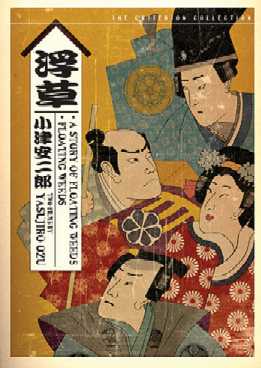|
Reviews of Recent Independent, Foreign, & Documentary Films in Theaters and DVD/Home Video
Directed by: Yasujiro Ozu. Produced by: Masaichi Nagata. Written by: Kogo Noda & Yasujiro Ozu, based on the 1934 Tadao Ikeda script. Director of Photography: Kazuo Miyagawa. Edited by: Toyo Suzuki. Music by: Kojun Saito. Language: Japanese with English subtitles. Country of Origin: Japan. 119 min. Not Rated. With: Ganjiro Nakamura, Haruko Sugimura, Machiko Kyo, Ayako Wakao & Hiroshi Kawaguchi. DVD Features: Commentary by film critic Roger Ebert. New digital transfer with restored image & sound. Trailer. New English subtitles.
A STORY OF FLOATING WEEDS (1934)
Floating Weeds and A Story of Floating Weeds depict the same moving story - an aging, traveling
actor returns to a remote
village where he secretly meets his former lover and her illegitimate son, to whom the older man is “uncle.” He’s
the manager of a kabuki troupe - the aimless flotsam of the title. His current mistress, filled with jealousy because of
his attachment to his secret family, tries to get back at him by deploying a game of seduction. Far from melodramatic,
these bittersweet films are directed with Yasujiro Ozu’s characteristic restraint. Almost always static, each beautifully composed shot could stand alone as a photograph.
In A Story of
Floating Weeds, a black-and-white silent film, scenes that
reflect the historical times of Japan - the houses, village life, and stage
performances - are like an encyclopedia of Japanese culture to the foreign
viewer, a typical attraction of Ozu's films. The commentary
by Donald Richie, a Japanese film historian and writer of Ozu, compares this
"new simplicity" to other Ozu films, explaining in detail the director’s intentions
in making this film and the artistic advancements he made in doing so.
In Floating Weeds, in color and with sound, the character have more depth. They speak in a Kansai accent,
which brings out a casual
lightheartedness that could not be detected in the original, and the
dialogue
makes this film more energetic rather than subtle, as in the earlier version. Accordingly, emotions are
more explicit. The major difference between the two films, however, is the portrayal of the abandoned mother. She is more accepting in the later version. Though both films share almost identical sequences and compositions,
much is modernized in Floating Weeds, such as girls
winking to gain attention or men sunbathing. The changes are further
explained in the commentary by Roger Ebert, who applauds the beauty,
simplicity, and consistency of Ozu’s work. Ebert admits he is no expert
on the director; he analyzes
each scene, often crediting other critics. His commentary is an excellent primer, especially those new to Ozu. Hazuki Aikawa, journalist, director of the documentary Yancha
|

